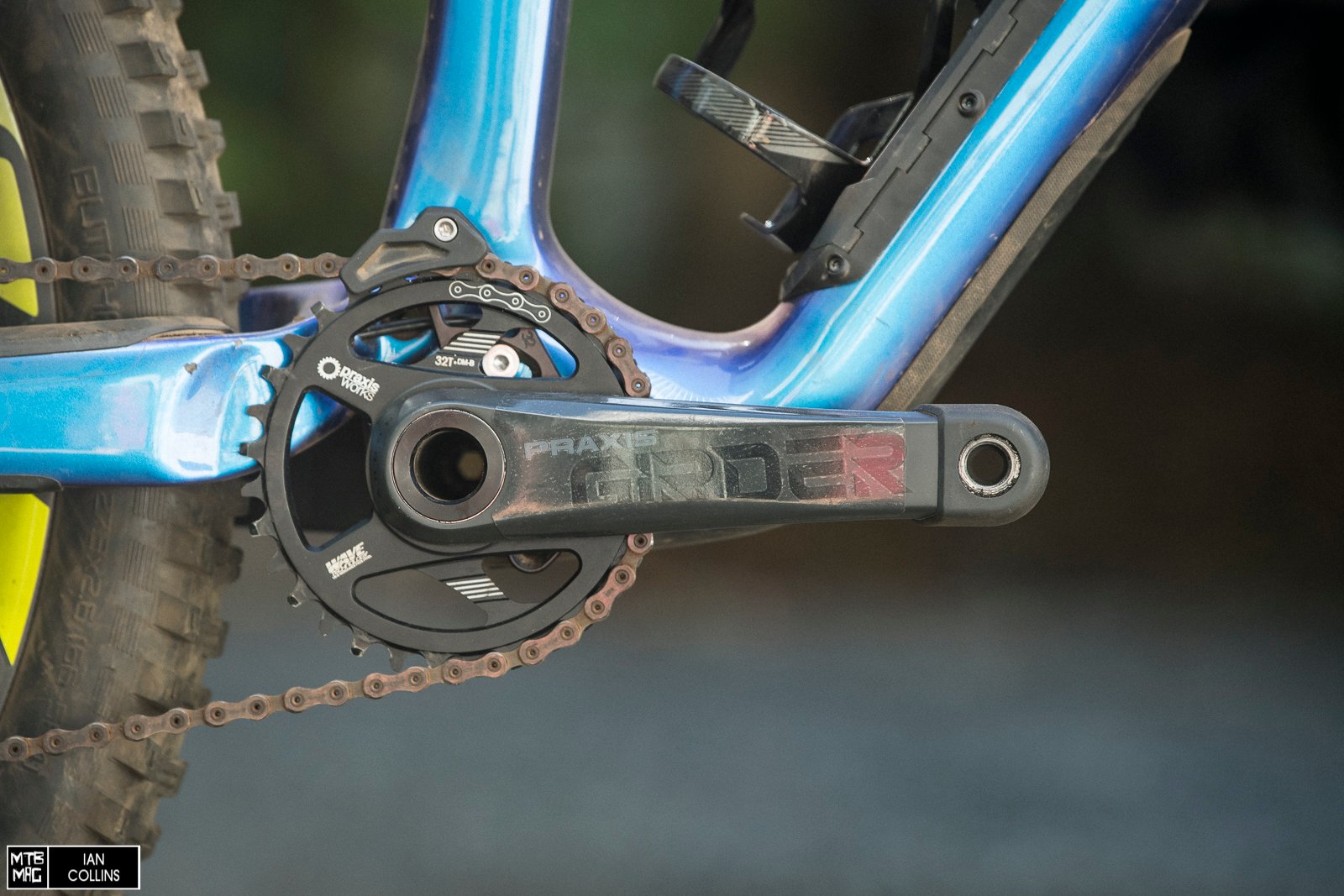[Tested] Praxis Works Girder Carbon M30
Some time ago we made the whopping 10 mile trip from Aptos over to the West side of Santa Cruz for a visit at Praxis’ headquarters. At the time, they sent us home with their flagship Lyft M30 cranks. Although the Lyft series cranks are aimed at the AM/Trail segment and come in at a steeper price, Praxis wanted us to check out the Girder Carbon M30 – a crankset that’s more aggressive in pricing and aimed at a more “all-around” duty. After a few solid months on them, here’s what we thought…

Details
- Carbon fiber crank arms
- 170mm (tested) or 175mm length
- 3-bolt direct mount chainring interface
- M30 Aluminum spindle (30mm diameter) requires Praxis M30 BB
- Wave Tech direct mount ring 49mm or Boost 52mm chain line
- Works with 10/11/12 speed chains
- Weight 541 grams (verified w/o crank boots)
- Q-Factor 172mm
- Trail/Enduro usage
- $310 USD, chainring included / $45+ for bottom bracket

The first thing you’ll take note of with the Grider crankset is just how burly it is. This is a common theme with Praxis cranks in general. With a massive, hollow aluminum spindle as a starting point, and stout, solid (read: not hollow) crankarms, they are staunchly aimed at the Trail/Enduro segment.

Nice custom touches on the crank boots…With the Girder, the crankarms themselves aren’t hollow like the Lyft cranks. Since Praxis engineers everything in house, they were able to design a stiff, strong, and more economically viable carbon crankset at a reasonable weight.

In our experience, Praxis bottom brackets are some of the best in the game. The Girders use the same BBs as other Praxis cranksets and are available in just about every possible modern configuration. Shown above is the threaded (BSA) version in our Specialized Enduro.

“WaveTech” is a chainring pattern that helps with retention. It strays from the conventional narrow/wide style pattern, and Praxis claims that it’s better at not only applying tension, but also clearing mud and grit. As you can see above, it’s more of an inboard/outboard style pattern. Last, but not least, it’s worth noting that this is a technology that Praxis and MRP both use as its development was a collaborative effort.
Installation
Included with the threaded bottom bracket, and necessary for its installment is Praxis’ BB tool. It pops right on to a standard socket and is easy to use. It’s worth noting that the Praxis cranksets with their standard “M30” spindle (like the Girder) don’t use a lock ring to secure and tension the bearings, rather, they use a wave washer for a foolproof preload. However, the Lyft series with the “M30 THRU” spindles do feature an alloy lockring for fine tuning bearing tension.

The bottom bracket(s) come with spacers of varying widths to get the proper chainline and allow for compatibility with an array of hub spacings, etc. The chainrings themselves are available in two different offsets (“DM-A and DM-B”). With our threaded frame, the installation was especially easy and we don’t anticipate any hangups with press fit frames.
On the trail
Rating cranks is a rather binary process, without a whole lot of room for middle ground. Between tires, suspension and wheels handling most of the shock absorption duties, it’s generally a bit difficult to discern how a crank rides unless it’s really noodly, or really stiff. In the case of the Girder, we’d rate them as being slightly, but noticeably stiffer than the SRAM XX1 cranks that they replaced on our Specialized Enduro. Being a bit on the burlier side, they’re likely a more fitting spec, given the bike’s appetite for gravity – but that’s another story altogether. All in all, they felt great on trail and gave us no reason to complain.

In terms of functionality and mechanics, the Girders were also quite good. The “Wave Tech” pattern kept the chain on nicely whether we used an upper guide or not. In the duration of testing, we never once lost a chain. The bottom bracket bearings proved to be robust, managing to survive a good deal of dust and frequent washings. We have to admit, with a testing period encompassing the Spring and Summer in California, they didn’t see any mud. Either way, there were no shortcomings mechanically, no creaks, no fuss and certainly no flex.
Overall
Here’s where we talk value. The closest set of cranks we would compare the Girder would likely be the Truvativ Descendant Carbon. The price and weight are close enough that they effectively come out in the wash – impressive given Praxis’ size compared to SRAM’s. Both cranksets are rated as being appropriate for the same ballpark type of riding. We’d give the nod to Praxis as being ever so slightly stiffer, particularly compared to non BB30 Descendants as the Girder has a beefier spindle. We have also had better luck with Praxis bottom brackets than most. It’s great to see another mid-priced, carbon fiber crankset entering the mix, offering decent weight savings and stiffness without breaking the bank too much. All in all the Girders are a great set of cranks and we’d feel confident putting them on any heavy duty trail/enduro rig for a good thrashing.
The post [Tested] Praxis Works Girder Carbon M30 appeared first on MTB-MAG.COM.
